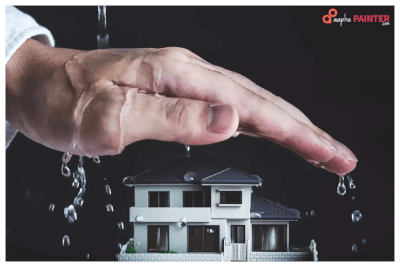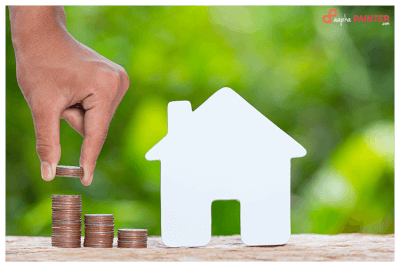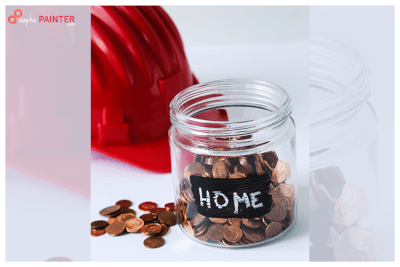Table of Contents
Waterproofing Help You Save Money
Oftentimes, we forget that our homes are made up of many different materials, all of which are susceptible to damage from water. Waterproofing your home can help to protect these materials and, in turn, save you money on repairs.
In addition, waterproofing can also help to prevent moisture build-up, which can lead to the growth of mould and mildew. Not only is this unsightly, but it can also be dangerous for your health! By waterproofing your home, you can help to keep your family safe and healthy.
The following will discuss how waterproofing services can help you save money:

What is Waterproofing?
Waterproofing is a process that helps to prevent water damage by creating a barrier between the water and the material you are trying to protect. This can be done in some different ways, depending on the material you are working with.
For example, if you are waterproofing a concrete wall, you would likely use a sealant or coating that would create an impenetrable barrier against the water. On the other hand, if you were waterproofing plaster, you might use a water-repellent agent that would help to keep the water from seeping in.
Many different products on the market can be used for waterproofing, so it is important to do your research and find the one that is best suited to your needs.
What are the impacts of Water Damage?
Foundation Damage:
- Water damage can weaken and severely harm the foundations of a structure. This is because, as the water infiltrates the underlying soil, it becomes moist, expanding and potentially making the structure crack or shift.
- Over time it increases the likelihood of an unleveled floor, misaligned doors and windows, and costly repairs too.
- Steady exposure to water can also weaken the concrete, furthering the damage and adding to the safety concerns.
Good drainage and waterproofing at the foundation can essentially fix these issues.
Leaky Roofs
- Water damage from a leaky roof is a common occurrence when the roofing material is damaged or deteriorated. Water coming in through a leaky roof may cause stains, sagging, and even structural damage right through to the roof itself.
- As time proceeds, the seepage may settle through the walls and insulation, leading to energy inefficiency and continuing deterioration. The objective, therefore, is to address leaks in time but not compromise the integrity of the roof to avoid expensive repairs and to keep the living environment dry and safe.
Mould and Mildew Growth
- Water damage creates a very conducive environment for mould and mildew to grow within 24-48 hours of the occurrence of water exposure.
- It grows well in damp, humid situations and can spread rapidly throughout a building.
- Besides the ugly stains and unpleasant odours caused, mould and mildew pose serious health risks, especially to people with allergies and asthma, or with any other type of weakened immune system.
- It is also necessary to act right away when there is any water damage, along with proper ventilation and moisture control to prevent mould from growing.
Deterioration of Building Materials
- Prolonged exposure to water degrades building materials, such as wood, drywall, and plaster.
- Wood tends to swell, warp, and eventually rot, affecting structural integrity in walls, floors, and ceilings.
- Drywall could soften, crumble, or develop ugly stains, while plaster can crack and may lose its adhesion. This breakdown in integrity weakens the overall structure, thus rendering the building unsafe and hugely costly to repair.
Prevention of water damage is vital for preserving the useful life of these materials.
Corrosion Damage
- Water damage can accelerate corrosion, especially in metal components of a building such as pipes, wiring, and structural reinforcements. Corrosion weakens these materials, leading to leaks, electrical failures, and potential structural collapse.
- It can also cause rust stains on walls and floors, detracting from the building’s appearance.
Regular inspections and maintenance, along with prompt repairs, are essential to prevent corrosion and extend the life of metal components.
The following are some ways you can save money with quality waterproofing:
Protects the Materials of Your Home
As mentioned before, one of the main benefits of waterproofing is that it helps to protect the materials of your home. Waterproofing creates a barrier between your home and moisture, which can prevent damage to the structure of your home. This is especially important in areas where there is a lot of rainfall or snowfall.
Moreover, extreme heat conditions can also cause damage to your home. Waterproofing can help to protect your home from the sun’s rays and prevent heat damage. This is especially important in areas that experience high temperatures on a regular basis.
When the internal and external layers of your home are protected, you save big in terms of repairs. Waterproofing can help to prolong the life of your home and save you money in the long run.
Reduce Your Home Insurance Costs
Another way that waterproofing can help you save money is by reducing your home insurance costs. Most home insurance policies will not cover damage caused by water. However, if you have a waterproof home, your insurer may be more likely to give you a discount on your premium.
Waterproofing can also help to protect your belongings from water damage. Therefore, you may not have to make as many claims on your homeowner’s insurance policy. This can help to keep your premiums low and save you money over time.
Lower Energy Costs
Waterproofing can also help you to save money on your energy bills. When your home is well-insulated, it will retain heat better in the winter and stay cooler in the summer. This means that your heating and cooling system won’t have to work as hard to maintain a comfortable temperature inside your home.
As a result, you’ll see lower energy costs each month. In fact, you may even be eligible for certain tax breaks or rebates if you insulate your home! Waterproofing can help you save money in more ways than one.
Increase Your Property Value

Moreover, waterproofing can help to increase the value of your property. If you’re thinking of selling your home in the future, a waterproof home will be more appealing to potential buyers. This is because they’ll know that the home is well-protected and won’t require as much maintenance.
Waterproofing can also help you to get a higher price for your home if you do decide to sell. Therefore, it’s an investment that can pay off in the long run! Waterproofing services : This is because when a potential buyer sees a well-maintained home, they will think that the home is worth more than a home that doesn’t have this type of protection.
Better Health and Lower Medical Bills
Most importantly, waterproofing can help to improve your health and lower your medical bills. As mentioned before, waterproofing can help to prevent the growth of mold and mildew. This is important because mold and mildew can cause respiratory problems, skin irritation, and other health issues like allergies.
In addition, if you have a family member who suffers from allergies or asthma, getting waterproofing services done, can create a safer environment for them. Mould and mildew can produce spores that, when inhaled, can cause serious health problems. And if you have kids and pets, these spores create a harmful environment for them as well. Waterproofing can help to create a safe and healthy environment for your family.
It is Not Just About the Money
While saving money is important, it is not the only reason to waterproof your home. A home is a place where you and your family should feel safe and comfortable. Waterproofing can help to create a healthy environment for your family and protect your belongings. It is an investment that will pay off in the long run!
Infestation
Lack of waterproofing creates wet and dark areas that may attract pests like rodents, termites, and insects. These pests love humid conditions and have been seen to breed in your walls, basement, and crawl space. Pest infestation could lead to serious health hazards since most pests carry bacteria, viruses, and allergens. Rodents, for example, can carry diseases, and mosquitoes can spread diseases like malaria. Waterproofing is done to avoid infestation by pests and to provide a healthy living environment by preventing the accumulation of moisture.
Infection
Without waterproofing, water-damaged areas can be potential breeding places for some very harmful bacteria, mould, and fungi. These can also infiltrate air supplies and water to produce respiratory infections, skin rashes, and other serious health complications. Those with weak body immunity can be at greater risk, besides getting worse infections. As mentioned above, inhaling mould spores can also trigger asthma attacks, allergic reactions, and chronic respiratory problems. Proper waterproofing avoids the possibility of such pathogens taking hold and thereby reduces the chances of infection.
Contaminated Water
Waterproofing failure may result in water infiltration, and contaminated water seeping into the living spaces of the home, particularly in basements or through cracked foundations. This could be deadly water, carrying a lot of pollutants, chemicals, and pathogens from the soil. Moreover, if it comes into contact with drinking water or surfaces in the home, it presents serious health concerns. Contaminated water has been known to cause gastrointestinal illnesses, skin infections, and other health problems, especially for the most vulnerable people with poor immune systems. Proper waterproofing ensures source protection and keeps your household safe from dangers related to waterborne contaminants.
Conclusion
If you’re thinking about waterproofing your home, be sure to contact a professional contractor. They can assess your needs and recommend the best course of action for your home. Don’t wait until it’s too late – waterproof your home today!
